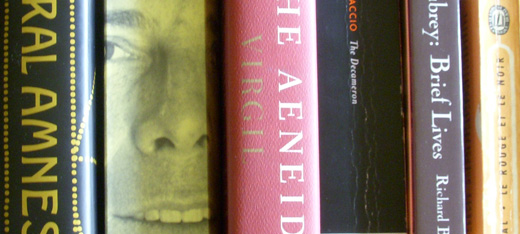Wednesday Morning Read
¶ Decameron X, vi, which tells the story of Messer Neri and King Charles of Sicily, sounds a lascivious note.
On seeing that the fish had been cooked, the girls emerged from the pool, their fishing done, with their thin white dresses clinging to their flesh so as to conceal almost nothing of their dainty bodies. And having taken up each of the things they had brought with them, they walked shyly past the King and made their way back into the house.
The girls, Neri’s twin daughters, have been paraded before the king as a gesture of trust, and the remainder of the story tells how sorely Charles is tempted to break it. An adviser convinces him that rape will tarnish his reputation — ordinarily an inducement for clever subterfuges in the Decameron. Charles marries the twins off to worthy young men, after which
he retired in agonies of despair to Apulia, where by dint of constant effort he mortified his ardent longings to such good and purposeful effect that the chains of Love were shattered.
Boccaccio seems to be winding up the Decameron on a note of unimpeachable virtue, while at the same time compensating for the drying up of ribald humor by tossing in fretwork that is nearly pornographic.
X, vi is also the last short story in the collection.
¶ In Aubrey, the remainder of the letter R: Randolph, Radcliffe — a sad paragraph about beauty destroyed by lusty pox — Rich (a medieval divine whose much-admired glazing in an Oxford church was destroyed by the Roundheads), Rocklington, Rolle, Rooke, Rumsey, and Rushworth. In connection with Henry Rolle, Aubrey mentions Serjeant Maynard, an official of the law courts whose edition of medieval law reports (whether his own work or simply named after him I don’t know) beguiled me for many hours during the third year of law school. I wish that Aubrey had written more about him.
I could gross you out by repeating Aubrey’s description of Walter Rumsey’s phlegm-removing device, with its mention of “vomits,” but I shan’t.
¶ In Merrill, a beautiful poem that I don’t begin to understand, “The Instilling.”
All day from high within the skull —
Dome of a Pantheon, trepanned — light shines
Into the body. Down that stairSometimes there’s fog: opaque red droplets check
The beam. Sometimes tall redwood-tendoned glades
Come and go, whose dwellers came and went.
Now darting feverishly anywhere, Manic duncecap its danseuse eludesNow slowed by grief, white-lipped,
Grasping the newel bone of its descentThe light can even be invisible
Till a deep sparkle, regular as script,
As wavelets of an EKG, defines
The dreamless gulf between two shoulder blades.
¶ Clive James on Federico Fellini:
Nominally an alumnus of neo-realism, Fellini looked as if he had gone to school in a party frock. Even among those who lauded him for the richness of his imagination, it occurred to nobody that he was the director with the most penetrating social vision. Such as estimation became possible only in retrospect, when it became apparent that no universal plan for society could be compatible with the autonomy of art.
The bracing thing about James’s “conservatism” — his opposition to plans and programs and utopian schemes — is that it’s motivated not by the grudge of economic injustice (almost hypocritically vicarious in so many who bear it) but by a furious belief in the necessity, for social health, of art’s autonomy. Not even this, however, is an absolute; in case after case he assesses the culpability of writers and artists who have either accommodated black regimes or attempted to duck them.

